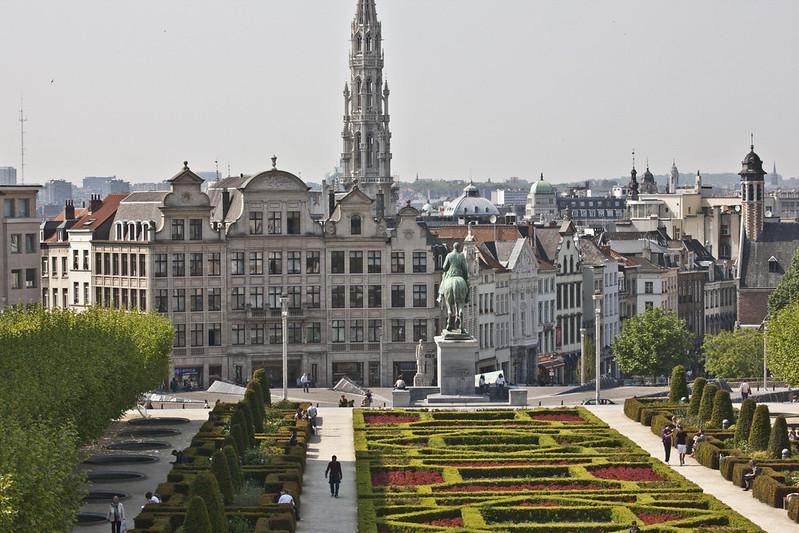BRUSSELS BEHIND THE SCENES
Weekly analysis and untold stories
With SAM MORGAN
Green city slickers
The European Union is on a mission to help 100 cities go carbon-neutral by 2030 with extra funding, preferential treatment and a dedicated platform to exchange ideas. But 100 cities will not be enough and you can bet that the list will grow in the coming months and years.
Under a new scheme aimed at helping 100 of the EU’s cities deploy smart policies and go carbon-neutral by 2030, more than €300 million will be available to help install renewable energy, plug leaky buildings and clean up transport.
The main point of the programme is to make it a team effort. Cities are a diverse bunch and what works in one might not be any good in another, so the ethos of giving them all one joint target that they can all work towards is a good one.
It is also a chance to try new things or at least scale up good ideas. Twelve percent of the EU population lives in these 100 cities, so if city authorities embrace this scheme wholeheartedly, there will essentially be 100 large-scale testbeds dotted around Europe.
BRUSSELS BEHIND THE SCENES is a weekly newsletter which brings the untold stories about the characters driving the policies affecting our lives. Analysis not found anywhere else, Sam Morgan helps you make sense of what is happening in Brussels. If you want to receive Brussels behind the scenes straight to your inbox every week, subscribe to the newsletter here.
That gives the EU a lot of green-tech and know-how export potential, as Europe’s efforts will be for nought if the rest of the world does not also get their act together in the coming years.
Cities now have to draft their climate-neutral contracts, which should include views from inhabitants, expert groups, the private sector and more. None of this is legally binding but by making the pledges so public, the EU is counting on pressure to keep authorities honest.
There are some notable absentees from the list of 100 willing participants: Berlin and Vienna are not on board yet, while island capitals such as Nicosia and Valletta – both valuable climate labs due to their isolated and unique profiles – are also missing.
More than 300 cities applied for the scheme and the European Commission is planning to make sure that those applicants are included in various platforms and given support where really needed.
It is not implausible to think that the scheme will be extended to more of those cities if the climate crisis continues to escalate, Russia’s war against Ukraine moves the needle in favour of green policies even more or some other unknown unknown presents itself.
Legal obligation
City authorities and national governments may soon have to clean up their urban sprawls faster than planned if certain court cases set legal precedents.
Next week, the European Court of Justice will publish its opinion on a French case linked to air pollution and the right to compensation. If the EU’s top court eventually rules a certain way, it could change Europe forever.
The court has been asked to rule on whether private individuals have a right to damages from the state if their health has been impacted by air pollution and under what circumstances compensation can be granted.
A Parisian plaintiff is demanding €21 million in damages, claiming that the French state has not done enough to prevent harmful air pollution. If the ECJ’s judges decide that there is a legal basis to their case, cities will simply not be able to afford to be smog-filled anymore.
France and pretty much every other EU member state is breaching EU pollution rules in some form or another, either in a sustained way in the biggest cities or periodically when there is hot weather or during the busy agricultural season.
The fact that France is breaking the law is not actually in doubt, the ECJ has already ruled on that issue in the past and the EU Commission has ongoing infringement procedures against its government.
If private citizens are granted a legal recourse, then investments in electric charging infrastructure, ultra low emission zones, road pricing and green-powered heating will come thick and fast. Those will be the cheap options.
The courts are slowly but surely cutting a path towards a greener future. The Dutch government was recently told that its climate targets are not strict enough and reduced the motorway speed limit as a quick fix to the issue.
Environmentalists regularly fail to make the case for the cost of inaction – the price tag that floods, famine, heatwaves and other climate-exacerbated phenomena will impose – largely due to the uncertainty inherent in predicting what those costs will be.
If the EU’s top court ends up giving the cost of inaction a legal basis and a financial penalty to boot, then you can guarantee that the energy transition will suddenly be running on rocket fuel.
BRUSSELS BEHIND THE SCENES is a weekly newsletter which brings the untold stories about the characters driving the policies affecting our lives. Analysis not found anywhere else, Sam Morgan helps you make sense of what is happening in Brussels. If you want to receive Brussels behind the scenes straight to your inbox every week, subscribe to the newsletter here.

